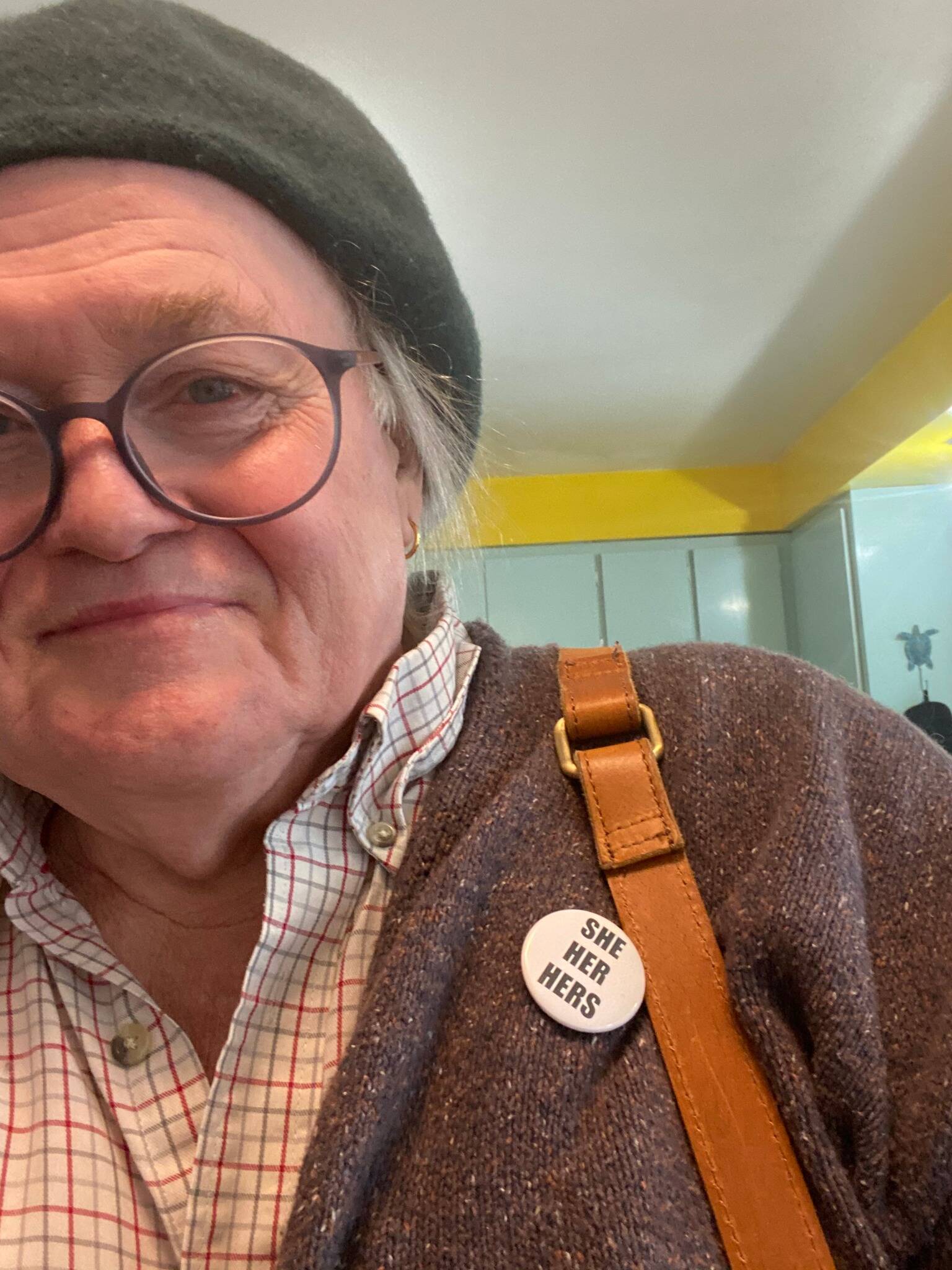By Jane Hale
This is the second part of a two-part column. Read the first part here.
I keep looking back over the past year for some moment, some epiphany that made me realize I was going to have to come out, open up about the person I perceive myself to be.
But it was nothing like an epiphany. Instead, it was a slowly gathering storm.
Caring for my sister in Florida, I had imagined the spirit of our mother telling me to care for my sister and myself. When your mother’s ghost tells you to do something, you listen.
I loved being there with my sister, but I also wanted to be back home caring for my partner Michelle the same way, with the same kind of maternal tenderness, giving her the support she needed from me.
Once I got back to Juneau I threw myself into being there for her, for us. At the time, with the pandemic still dangling over our heads (along with her own Damoclean work ethic), her professional responsibilities demanded all of her attention, so I took over caring for the house and our dogs so she could focus on her work.
I was suddenly giddy with energy. I painted the whole kitchen, gaily slinging paint on the walls and cabinets — a light teal on the cabinets, and on the walls a bright, vivid yellow. This is one cheerful kitchen.
I’m not suggesting that I associate domesticity with femininity. On the contrary, I see in Michelle a model of what it means to bear considerable civic responsibility. She has a favorite quotation from the late Secretary of State Madeleine Albright: “the leader is the one who leads.” Michelle stepped up to take responsibility when it was needed.
Following her example — and my mother’s admonition — I decided that I would too, wherever needed, whatever the avenue. And maybe it was coincidental, but as I assumed those domestic responsibilities I began experiencing a kind of maternal tenderness toward myself. Caring for others was a way of caring for myself.
I knew this. I knew it in my gut from raising five kids. And I had known it intellectually since the 1980s from the works of ethicist Carol Gilligan. Trashing Freud’s argument that women aren’t capable of a sense of justice, Gilligan argues that women and men tend to view concepts like justice and responsibility differently. Men, she writes, tend to see responsibility for others coming after one has first become responsible for oneself. Women, on the other hand—and this is how I view myself — tend to see responsibility for oneself emerging from one’s primary responsibility for others.
(These are not, of course, stable tendencies. Most of us approach responsibility differently at different times, shuttling back and forth between prioritizing our responsibilities to others and to ourselves.)
My caring for my sister and for my partner gave me a new sense of responsibility toward myself, a sense of both obligation and a desire to be myself openly, to explore a self I still don’t understand, to unveil a self I never imagined being able to reveal.
The time seemed to be getting right. Younger generations have had the courage to open these conversations about gender in a way that was unthinkable 20 years ago.
I wouldn’t have to face some of the obstacles others have confronted in transitioning. I’m retired, so I’d have no workplace issues to deal with. My parents have long since descended into the grave, so their hearts wouldn’t be broken by something they could not or would not understand.
I knew my friends and relatives would be surprised, but I could tell you–to a person–who would be silent and who rally in my support.
My mother-in-law, Sylvia, for example. A great woman, an Alaskan original, she has never bothered much with feminine stereotypes. I knew she’d understand my issues with masculine ones.
I wasn’t able to tell my college pal Kevin before he read the first column. I wish I could’ve seen his jaw drop. We’ve been friends since the mid-1970s, and I knew he’d stay a friend through it all.
My kids are grown and out of the house so I wouldn’t have to deal with school teachers and administrators and childhood friends—or worse, the parents of childhood friends. And my kids all have the most outlandish sense of humor; I knew I could rely on them to keep things real.
And, of course, my twin sister, Judy. I’ve been inspired by her example and her love my whole life. I knew she would continue to inspire me.
Most of all, I knew I could rely on Michelle. She has an incisive curiosity and a wicked acuity that I counted on to help me understand this thing. And, God help her, she loves me. I couldn’t do this without her.
Twelfth-century philosopher Héloïse d’Argenteuil writes about marriage’s “sacred delusion” —the belief that there’s no better partner in the world than one’s own. Such a belief may be delusional, writes Héloïse, but it’s true nevertheless. And she notes that this observation is not strictly speaking philosophy, the pursuit of wisdom. Rather, this is wisdom itself.
And in my case, it’s no delusion.
• Jane Hale spent her first 69 years writing as Jim. She is a longtime Juneau resident. “Coming Out” is a biweekly column. It appears on the Empire’s Neighbors page.

